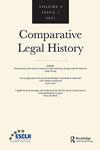States and non-state actors in hegemonic and counter-hegemonic narratives in international law: the Nigerian experience
IF 0.5
Q2 LAW
引用次数: 0
Abstract
The historical background of Nigeria as a state and how state and non-state actors within its domain influence the nation's domestic and international activities demonstrate the conflict and complexity between dominant ideologies and resistance between competing actors in Nigeria. Such struggles arose following the imposition of colonial rule and subsequent introduction of the English legal system, which unsettled existing indigenous systems that were hugely dependent on customary law. Although such platforms successfully served colonial interests, they were challenged by different resistance groups. Through historical narrative, this paper contributes to Global South scholarship in the hegemonic and counter-hegemonic discourse in international law, with Nigeria as a case study. The paper shows that in order to successfully address hegemonic tendencies, which flow from the international system and are sustained by the Nigerian state, the resistant role of non-state actors is imperative in the making of international law to accommodate the Nigerian experience.国际法霸权和反霸权叙事中的国家和非国家行为者:尼日利亚的经验
尼日利亚作为一个国家的历史背景,以及其领域内的国家和非国家行为者如何影响国家的国内和国际活动,表明了尼日利亚主流意识形态与竞争行为者之间的冲突和复杂性。这种斗争是在实行殖民统治和随后引入英国法律制度之后产生的,这使严重依赖习惯法的现有土著制度感到不安。尽管这些平台成功地为殖民地利益服务,但它们受到了不同抵抗团体的挑战。通过历史叙述,本文以尼日利亚为例,对国际法中的霸权和反霸权话语中的全球南方学术做出了贡献。论文表明,为了成功应对来自国际体系并由尼日利亚国家维持的霸权主义趋势,非国家行为者在制定国际法时必须发挥抵抗作用,以适应尼日利亚的经验。
本文章由计算机程序翻译,如有差异,请以英文原文为准。
求助全文
约1分钟内获得全文
求助全文
来源期刊
CiteScore
1.70
自引率
0.00%
发文量
20
期刊介绍:
Comparative Legal History is an international and comparative review of law and history. Articles will explore both ''internal'' legal history (doctrinal and disciplinary developments in the law) and ''external'' legal history (legal ideas and institutions in wider contexts). Rooted in the complexity of the various Western legal traditions worldwide, the journal will also investigate other laws and customs from around the globe. Comparisons may be either temporal or geographical and both legal and other law-like normative traditions will be considered. Scholarship on comparative and trans-national historiography, including trans-disciplinary approaches, is particularly welcome.

 求助内容:
求助内容: 应助结果提醒方式:
应助结果提醒方式:


